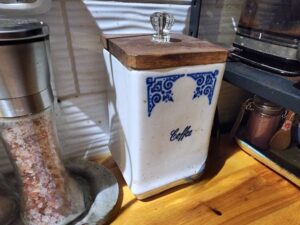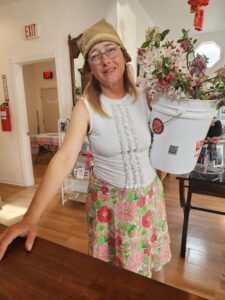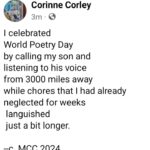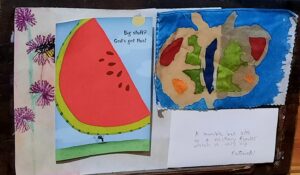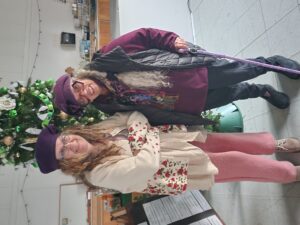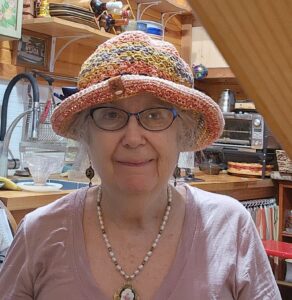I have given a lot of thought to my hidden talents. Undertakings at which I excel seem few to me: I can cobble together a decent sentence. Though I cannot multi-task, I can hold a safety pin between my pursed lips while I walk across a room. That has to count for something.
In my heart of hearts, though — the secret essence of my being — I do not doubt the true nature of my super powers. They number three: Over-thinking the obvious; romanticizing the mundane; and contorting every interaction into something for which I can be blamed.
When a pile of books falls onto the floor, I dash to rescue every volume. Despite my distance from the calamity, I accept fault for the crash. In fact, by the time I get done apologizing, the booktender’s scowl will have deepened and targeted my retreating back.
I’ve accepted responsibility for all three of my divorces, a half-dozen car accidents in which I actually had no role, and the decline of an orchid that a friend brought me which I promptly re-gifted to forestall its demise. I vividly recall a lunch with my mother during college in which I began to think I had caused the crash of the silver market by trying to find the price of what I (erroneously) believed to be a rare dime. Whether due to my Roman Catholic upbringing or the burdens of unresolved childhood difficulties, I remain convinced that it is all my fault.
People like to have someone else accept the blame. My brother-in-law JD will shrug and announce that he accepts full responsibility. He invites you to advise him of how bad you want him to feel. He assures you that he will keep you alerted as to his progress. “I’ll let you know when I get there,” he promises. The irony drips from his words. But I say it with profound seriousness, and I have found that people do not hesitate to provide a standard by which to assess my remorse.
I stopped patronizing the public library years ago because I can’t be trusted to return books on time. I uniformly paid for extra trash tags because I assumed that my garbage exceeded the allowed weight. I replace things that I might have broken when I visit someone’s home, even though I truly have no idea whether or not I did. Just in case. I’m not sure, but I might have stepped on your cat’s toy. Here’s ten dollars to replace it. Very truly yours.
In fact I have become adept at the art of apology. I might insult you, disappoint you, damage your best blouse, or break your heart. Expect flowers and a note disseminated to anyone on the radar of our mutual acquaintance. I will describe the wrong that I have visited upon your innocent head. Your faultless state will be extolled. My despicable character will wither under my own ruthless castigation of it.
Truth told, I have no idea how many times I have apologized for something in which I had no part. I’m the classic case of a woman who can be abused without acknowledgment while I excuse my emotional reaction a thousand times and counting. My actual wrongdoing probably hits an average mark but you would never know that to hear my account of my failing.
Mostly, though, I keep my self-condemnation quiet these days. I bite my tongue unless the other person audibly expresses anger, and then I offer such contrition as I expect will smooth the path between us. It no longer matters who’s to blame. I understand that I’m likely over-reacting. I strive for peace. Wrongful accusation seems a fair price to pay.
Silence might portend inner reflection. I look across an expanse of time to gentler days, when I accept that some things do not rightfully claim me as their cause. Until such time as I learn that welcome lesson, I continue to flex my super powers, hoping, if not for lasting truce, then at least for a temporary cease-fire.
It’s the nineteenth day of the one-hundred and twenty-third month of My Year Without Complaining. Life continues.

A ship headed to the Pacific nears the confluence of the San Joaquin and Sacramento Rivers just east of the Suisun Bay.
A thousand miles beyond this sun-steeped wall
Somewhere the waves creep cool along the sand,
The ebbing tide forsakes the listless land
With the old murmur, long and musical;
The windy waves mount up and curve and fall,
And round the rocks the foam blows up like snow,—
Tho’ I am inland far, I hear and know,
For I was born the sea’s eternal thrall.
I would that I were there and over me
The cold insistence of the tide would roll,
Quenching this burning thing men call the soul,—
Then with the ebbing I should drift and be
Less than the smallest shell along the shoal,
Less than the sea-gulls calling to the sea.
— Sara Teasdale, (1884 – 1933)
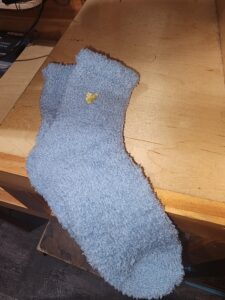 Perhaps a half-dozen people know about my gnarled feet: A few doctors, a couple of ex-husbands, and my son. I keep my feet covered at all times. No sandals grace my shoe bench; though I used to get pedicures, I always went to the same woman. Shortly after moving to California, I tried getting my toes done and encountered not one but two shocked pedicurists. I abandoned that luxury.
Perhaps a half-dozen people know about my gnarled feet: A few doctors, a couple of ex-husbands, and my son. I keep my feet covered at all times. No sandals grace my shoe bench; though I used to get pedicures, I always went to the same woman. Shortly after moving to California, I tried getting my toes done and encountered not one but two shocked pedicurists. I abandoned that luxury.